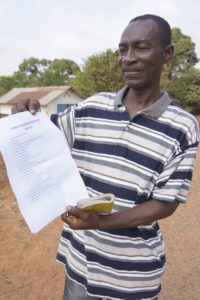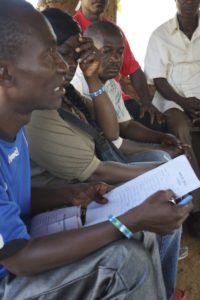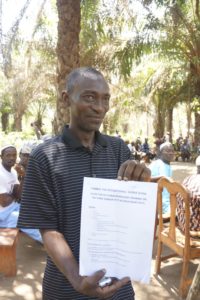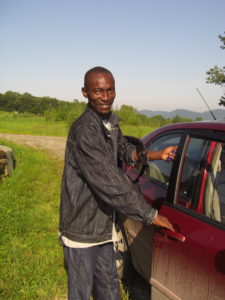This morning 4600 miles away, my colleague Sheku Koroma passed on after a short illness. I didn’t even know he was sick. I was stunned, shocked and in disbelief. I had just emailed him to ask for clarification about content for a manual we are working on together. Catalyst for Peace and Fambul Tok, where Sheku has worked since its inception, have been partner organizations, and the staff of both organizations have worked together on many aspects of the reconciliation and organizing work that has been centered in Sierra Leone. The manual describes the process he and his colleagues in Sierra Leone have been designing and carrying out in hundreds of communities – a process that invites community members to the center of the decision-making and action to recover from Ebola and strengthen their communities.



Our work on the manual began with Sheku and other FT colleagues writing about their process and sending it to me. I formatted the information and asked questions about things I wasn’t understanding, while also drafting some of the big picture and synthesizing pieces for the Manual. Knowing the process from a distance but not being intimately connected helped me see some of the pieces that the staff, who were daily at work in villages all over the country, took for granted.
The last email I sent to Sheku asked a clarifying question and described a new awareness I was coming to about the depth of knowledge, skill and embodied values required to do the work he was describing. Putting those values into a training was not going to be a simple task. I was hoping he would read those words and know how much I saw and appreciated the work he and the other staff had done. I was expecting a response from him in my in-box rather than his name in the subject of an email announcing his passing.
The morning we received the news, our staff at CFP sat together in our virtual office, ZOOM (we work from 3 different states), and grieved Sheku’s loss. Some of us cried. We shared memories of working with him. We appreciated the unique genius he brought to the organizing work in local communities – his gentle, respectful, and patient disposition. People felt respected by him. They connected with him, understanding that he wasn’t just trying to complete a project. He was walking with them, learning from them, understanding that they were the ones who would make the difference, and reflecting that understanding in ways that helped them claim their voices and power. He understood what it meant to support local ownership and leadership.
In our virtual office, we talked about the hard work Sheku had put in over the years, about the loss of his wife a year ago, about what we were imagining his children were experiencing with the loss of their second parent and about how the rest of the Fambul Tok staff would be feeling. We considered the strenuous travel required by his job and, ultimately, his decision to make a contribution that invited thousands of people and communities into a fuller sense of their capacity and agency, into what they can be when they lean and draw on the potential of their whole community.
 As I sat with the manual content, I could more clearly see the degree to which Sheku had influenced the process we were describing. In reference to spot checks – the visits made to communities to ensure the people chosen by their community to represent them fulfilled certain criteria (including that their community had chosen them) – he wrote “The checking should be done professionally and politely in line with customs and traditions.” This describes the respect with which Sheku treated people – especially those who were not always treated well.
As I sat with the manual content, I could more clearly see the degree to which Sheku had influenced the process we were describing. In reference to spot checks – the visits made to communities to ensure the people chosen by their community to represent them fulfilled certain criteria (including that their community had chosen them) – he wrote “The checking should be done professionally and politely in line with customs and traditions.” This describes the respect with which Sheku treated people – especially those who were not always treated well.
In rural Sierra Leone, outsiders often come into a community to complete a project and sometimes forget the basic respect due all people. Sheku’s ability to be professional and polite with everyone in spite of the overwhelming tasks to be accomplished and his position in an NGO, a position that could serve as a point of separation between him and community members, is something to emulate. I know that in spite of my best efforts, I often fall short of breaking through the many stereotypes and barriers that would get me to the point of seeing people’s full value and potential and treating them with the utmost of respect. How often do I, or many of us, simply not fully see each other? Sadly, I think it’s more often than not.
Without him, the Fambul Tok process would not have had the transformative impact it’s had, and the staff that he worked with would not have had his example of being guided by and living out values. Sheku wasn’t someone who wanted to be at the center of attention. He did his work consistently and quietly. He lived what he professed and believed. However, his passing has further ingrained in me the value of demonstrated respect for all people. It’s what invites their capacity. I’m grateful that my path crossed Sheku’s and I could witness his example. May his spirit continue in all of those his life touched.
for other tributes to Sheku, see these posts.

